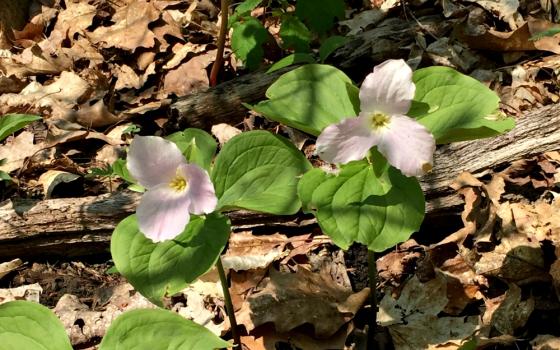As I write this, my congregation, the Ursuline Sisters of Cleveland, is building a new, smaller residence to replace a sprawling motherhouse that is being sold along with part of our property.
We have not received a postulant in many years. Our median age is 76. "Coming to completion" has appeared recently as a description of this time in which we, along with many other small congregations of women religious in the U.S., find ourselves. As I wrestle with this phrase, it calls to my mind a future in which we can all gratefully "rest in peace" as our congregation's story reaches its foregone conclusion.
I find more appealing words in the LCWR presidential address "The Future Enters Us Long Before It Happens," given by St. Joseph Sr. Mary Pellegrino on Aug. 10, 2017. She offers a language that speaks to my heart, words that give me hope for a future yet unknown, but one that enlivens my spirit.
She identified a "narrative of deepening communion" to be emerging as today's story of vowed women religious. This new narrative, which she posits is replacing the "diminishment narrative," is energizing for me, as I prepare to celebrate my golden jubilee later this year. To embrace deeper communion is language that resonates with my own experience of God's call.
Lest you think I keep company with the ostrich, I am well aware of demographics and sobering projections regarding the future of religious congregations; however, I prefer to actively name my congregation's narrative to be that of deepening communion, even as we age.
Language is powerful in its ability to shape our perspective. How we name our reality can, to some extent, lead us to very different conclusions. Even when described in the context of the paschal mystery, if the narrative we tell ourselves and others is a story of gradually dying out, then there's the distinct possibility we will simply resign ourselves to accept this type of future, albeit with the best of intentions.
If we choose a diminishment narrative, we run the unnecessary risk of closing in on ourselves, becoming preoccupied with protecting ourselves and our assets, expecting leadership to reassure us that we will be taken care of until the last sister dies. Settling into a more or less comfortable state of awaiting the end, we can be tempted to lose connection with the dynamism of our original call to the vowed life.
Being attentive to, embracing, deepening communion is of critical importance as we seek to follow Jesus, who reverenced all as one. "Embracing" is a warm, inviting, active verb that reaches out and presumes an attitude of openness to its object. It connotes an experience of spaciousness.
Isn't the phrase "deepening communion" more powerful and stirring than "coming to completion"? Aren't we living into a growing awareness today that our evolutionary universe is being attracted to ever greater union with an expansive God?
The women and men who founded our congregations possessed hearts on fire. In 1535, when she was in her 60s, St. Angela Merici, founder of the Company of St. Ursula, encouraged her sisters, "Do something, get moving, be confident, risk new things, stick with it, then be ready for big surprises" (as translated by Ursuline Sr. Terry Eppridge).
This contemporary translation of her writings underscores her action-oriented and faith-filled spirituality. I believe her challenge continually reminds us of the critical importance of keeping our focus on continuing to "be alive," so as to be of service.
"Coming to completion" would never have been her vocabulary of choice, but it is this language that identifies the current obsession with youth in the U.S. Those over 70 are old, near the end, and presumably already have one foot in the grave.
In a Washington Post article by Laura Carstensen, "In search of a word that won’t offend 'old' people," we are offered a refreshing descriptor, "perennials," which she borrows from Maureen Conners.
This powerful language upends our thinking as it recalls memories of brightly hued flowers, reliably returning each spring. Life is ongoing, unfolding, ever new.
Isn't this the narrative of religious life that enlivens, a narrative we can joyfully author, the narrative of perennials, never coming to completion, always embracing a future that calls us to be one?
[Sr. Virginia DeVinne has served as general superior of the Ursuline Sisters of Cleveland. Her present ministry as associate director of advising is focused on supporting students as they transition to higher education at Ursuline College.]

